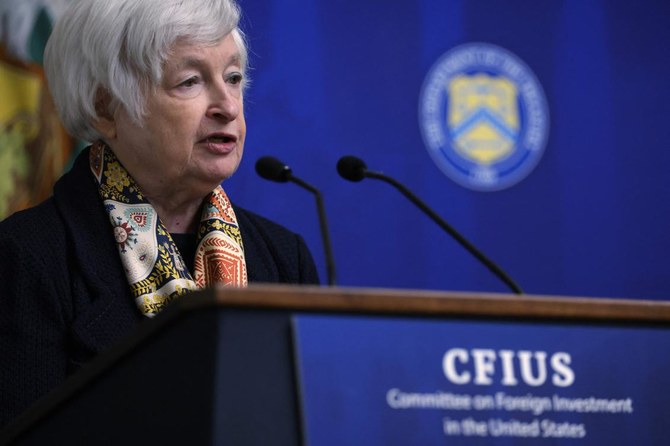BAGHDAD: Iraq’s central bank must address continued risks of the misuse of dollars at Iraqi commercial banks to avoid new punitive measures targeting the country’s financial sector, a top US Treasury official said, citing fraud, money laundering and Iran sanctions evasion.
In July, the United States barred 14 Iraqi banks from conducting dollar transactions as part of a wider crackdown on the illicit use of dollars.
Despite the crackdown, the senior US Treasury official, who spoke on condition of anonymity, said there were still other Iraqi banks operating with risks “that must be remediated.”
With more than $100 billion in reserves held in the US, Iraq is heavily reliant on Washington’s goodwill to ensure oil revenues and finances do not face US censure.
The official said the US action in July had been based on clear indications of illegal financial activity and the alleged crimes the Treasury was looking into included money laundering, bribery, extortion, embezzlement and fraud.
Iraq’s central bank governor has said Iraq is committed to implementing tighter financial regulations and combating the smuggling of dollars. The central bank did not immediately respond to a request for comment on Thursday.
Farhad Alaadin, the Iraqi prime minister’s foreign affairs adviser, said the government had taken “hard measures to make sure that Iraqi interests are protected while improving the banking sector and the transfer market.”
“The Iraqi government is serious about continuing on the path of reform and fighting corruption,” Alaadin said.
Iraq has more than 70 private banks, a relatively new feature in a sector that was almost entirely controlled by the state until Saddam Hussein was toppled in the US invasion of 2003.
Of those, just under a third are now on USblacklists.
“I chose to focus on the banks that still have access where I see continued risk,” the official told Reuters in Baghdad.
“It would be great if the central bank took the opportunity to address it directly, which would perhaps obviate the need (for the US) to take any further actions.”
The Iraqi government came to power with the support of powerful, Iranian-backed parties and so cannot afford to alienate Tehran, nor anger the parties and armed groups with deep interests in Iraq’s highly informal economy.
Iran’s foreign ministry did not immediately respond to a request for comment.
The 14 banks given dollar bans in July have urged the Iraqi government to remedy the measures against them and said they work in compliance with regulations.
The Treasury official said that Iraqi Prime Minister Mohammed Shia Al-Sudani’s government, which was appointed in October 2022, had been cooperative and there had been “progress,” something that had “not been necessarily the case” in the last 10 to 15 years.
However, there were still “vested interests comfortable with the status quo that can create friction to driving change,” the Treasury official said, without identifying who these were.
’MASSIVE THEFT’
The US measures have centered on Iraq’s so-called dollar auction, where the central bank requests dollars from the US Federal Reserve before selling them to commercial banks, which in turn sell to businesses in the import-dependent economy.
Between $200 million to $250 million is auctioned daily.
Before the enhanced US measures, large sums of money were illegitimately acquired by groups who would provide fake invoices. “Significant volumes” would then be smuggled to neighboring countries, including Iran, the official said.
A feature of a highly informal economy, the auction system was also used by thousands of small businesses that needed dollars but were not formally registered with the state, and so provided false information, Iraqi officials have said.
The enhanced scrutiny not only targets Iran but is part of a broader push to “normalize” Iraq’s financial system and combat a slew of financial crimes, the official said.
“I care about that (sanctions evasion), but we also have to care about massive theft and fraud and faked identity and ghost salaries,” the official said.
When Iraq began implementing enhanced measures via a new online platform in January that includes details on end-beneficiaries, roughly 80 percent of transactions were rejected but now that number is around 15 percent, Iraq’s central bank says.
Still, Iraqi officials say the measures have led to a dollar shortage, which has led the Iraqi dinar to change hands at more than 1,500 per dollar in the unofficial market in recent months, up to 15 percent weaker than the official rate of 1,320.
The US Treasury official said that the initial high rejection rate was largely tied to a “steep learning curve” on how to fill out forms and issues such as software bugs, that were now being addressed.















